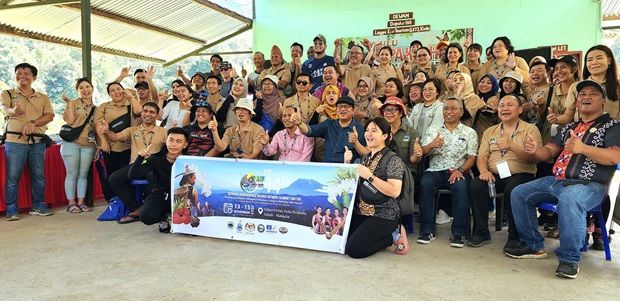Bangkuai (second left) sharing a light moment with Timor-Leste State Secretary for Forestry Fernandinho Vieira da Costa at the Lingga Eco Tourism in Kiulu.
KOTA KINABALU: Sabah’s push on rural tourism has attracted interest from southeast Asian neighbours Timor Leste.
Its Secretary of State for Forestry Fernandinho Vieira da Costa said his country was keen to work with the state in conservation and community-based tourism (COBT) initiatives.
Costa conveyed this to Sabah Tourism, Culture and Environment Assistant Minister Datuk Joniston Bangkuai during his recent visit to the Lingga Eco Tourism in the semi-rural Kiulu sub-district, some 40km from here, recently.
Costa said he saw Sabah as a model for successful community engagement in tourism, which Timor Leste could replicate and adapt these practices to its own unique cultural and environmental context.
He highlighted the importance of responsible tourism practices, emphasising the potential for economic growth and cultural preservation through community involvement in the tourism sector.
He said Timor Leste was also interested to learn from Sabah Parks’ expertise in sustainable tourism practice, nature, and wildlife conservation, as well as from the Sabah Forestry Department’s experience in managing and preserving extensive forested areas.
Costa explored Kiulu alongside participants attending the 14th Southeast Asian Biosphere Reserves Network (SeaBRnet) Meeting and International Conference during their post-meeting field trip.
The Kiulu assemblyman was present to welcome the group, alongside Sabah Parks director Dr Maklarin Lakim and Kiulu Tourism Association president Mejin Moginggow.
Notable participants included Unesco chair on education in biosphere reserves from Japan’s Yokohama National University, Prof Hiroyuki Matsuda, and representative of Unesco Jakarta director Ryuichi Fukuhara.
Meanwhile, Hiroyuki expressed delight at witnessing the community-based tourism initiative in Kiulu, emphasising the positive experience but also noted opportunities for improvement.
Additionally, he highlighted the vital need for young people, especially graduates, to return to their villages and contribute innovative ideas, drawing parallels to successful practices in Japan that have driven community development.
In his address, Bangkuai explained that Kiulu sits within the Crocker Range biosphere reserve and highlighted the commitment of Kiulu villagers to collaborative efforts, emphasising their dedication to empowering the community through tourism initiatives.
He said that Lingga Eco Tourism achieved revenue of up to RM20,000 a month, providing the community with financial assistance to alleviate villagers' economic challenges.
“We are still in the infancy stage as compared to other countries like Indonesia and Thailand. Sabah only started to go strong on rural community tourism in 2014.
“Nevertheless, we are swiftly catching up and this highlights the significance of gathering feedback from visitors to identify ways in which our communities can enhance their services and offerings," Bangkuai said.
Organised by Sabah Parks in collaboration with the Kiulu Tourism Association, the group's excursion was a side activity of the 14th SeaBRnet Meeting hosted by Sabah from Nov 13 to 14.
Centered around the theme "Envisioning People in Biosphere Reserves Living in Harmony with Nature," the meeting gathered regional and international stakeholders to exchange ideas, best practices, and innovative approaches.






